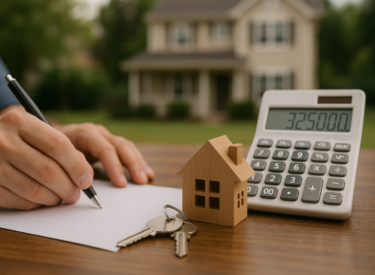With our housing markets picking up around Australia there's a whole young generation of first-home buyers getting onto the property ladder.
The problem is, many of these First-time property buyers forget that the purchase price is not the end of their homeownership financial outgoings.

There are a number of expenses that will continue for as long as you own the property – and even after the mortgage is eventually paid off.

Note: The problem is that currently, our markets are moving faster than many first-home buyers can save the extra money, so some are cutting corners just to get into the market.
While some compromise on the location or the size of their property, others cut corners with their finances, overspending and leaving themselves tight.
So, if you're in the market for your first home, you must know exactly what you, as the owner, will be liable to pay (sometimes each and every year), because not all expenses can be passed on to tenants.
1. Property Taxes
One of the biggest taxes that Australian property owners pay is stamp duty, which is a State-based tax, due at the time of settlement.
There is also potential Capital Gains Tax to pay when you finally sell your property – hopefully in many years or decades' time!
Of course, there's no CGT on your principal place of residence, but there would be if you sell an investment property.
While these taxes are the most obvious, property investors and homeowners are also responsible for other taxes throughout the ownership period of their home or investment.
The principal ongoing taxes are:
- council rates, which are assessed on the current value of the property and can change over time to reflect the home's change in value (which is usually up)
- Water rates and
- Land Tax – the amount varies from State to State, depending upon the total value of all the property you own in a particular state as of 31 December, minus exempt land such as your home.
Of course, these taxes can change over time reflecting the increased value of your property.

2. Home Insurance
While tenants are responsible for their own contents insurance, investors must have adequate insurance to protect the property as well as its occupants.
In Australia, it's common for homeowners to take out comprehensive building and contents insurance, which will cover the cost of rebuilding the property, inside and out, if destroyed by a fire, for example.
Strata insurance is a little different and is usually paid out of an investor's body corporate or owner's corporation levies, however, it is still an expense.
Investors should also seriously consider taking out a landlord insurance policy, which can provide cover for such things as malicious damage by a tenant, loss of rent, and public liability insurance if a tenant or a visitor injures themselves while at their rental property.
3. Mortgage Interest
The amount you'll pay in mortgage interest over the duration of your mortgage depends upon the length of time you take out your mortgage (or the number of years that it will take you to repay your home loan), the frequency of payments, and the interest rate.
The interest rate on your mortgage can fluctuate over time, depending upon the type of mortgage you select, such as a variable rate, and whether interest rates move up or down – which they regularly do depend on economic factors.
How much is your mortgage going to cost you over the life of your loan?

Tip: Find out now by using our Mortgage repayment calculator
You'll find that even a small change to your mortgage repayment strategy could save you a fortune in the long run.
That’s why we’re providing you this mortgage calculator which will allow you to test different options that will be a useful tool to assist in planning your financial future.
Switching to more frequent payments or saving just 0.10% on your home loan interest could greatly reduce the amount you would need to pay over the total length of the loan.

4. Property Maintenance
Homeowners can't simply call the landlord when the appliances need to be replaced or the hot water tank stops working.
All these home maintenance tasks - and even the larger home renovations - are the responsibility of you - the homeowner
As properties and their fixtures and fittings age, homeowners, and investors need to spend money to keep their properties in tip-top shape.
This may include new appliances such as fridges or ovens, but can also include new carpet, a new balcony, or a new roof.
That's why it's vitally important to budget every year for ongoing maintenance.
Addressing maintenance issues as they arise can help to safeguard you against any major expenses down the track.
Of course, there's also the garden, landscaping, and lawn care required for your property. You'll either need to do the work yourself or allow the cost of somebody else to look after these tasks for you.
5. Real Estate and Legal Fees
The mere act of buying or selling a home comes with costs with the seller generally faced with paying a commission to the sales agent.
Both buyers and sellers usually also pay legal fees to cover the transfer of title and conveyancing, which varies depending upon the lawyer and any additional searches that may have been undertaken.
And of course, there will be the ongoing property management fees if you’re an investor – but of course, these will be tax-deductible as they are a cost of your ongoing property investment business

6. Owners' Corporation Fees.
If you own a strata apartment there will be fees that are required to cover the common building maintenance and upkeep and common and public liability insurance.

Tip: Keep in mind that your current landlord is paying all these expenses for the property already living in.
But as you can see, owning a home or an investment property comes with it a raft of ongoing expenses that unfortunately don't usually reduce over time.
This means that when considering your property purchase you must calculate all of the ongoing costs so your property journey is not hamstrung by cash flow issues that may prevent you from growing your portfolio.
Owning a home or investment property can be a lucrative wealth creation strategy but you must go into it with your financial eyes wide open.














